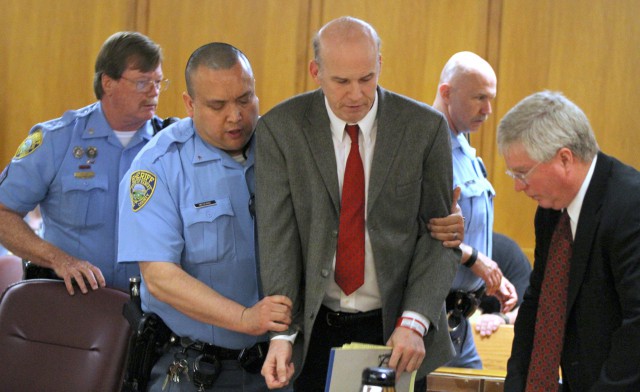
The “Hard 50” sentence requires Roeder, 52, to serve at least 50 years before he can be considered for parole.
“Mr. Roeder chose church … where one would expect
to be safe and let their guard down,” Wilbert said. “He intentionally
killed Dr. Tiller in the very place that abhors violence — a church.
“Mr. Roeder shot and killed Dr. Tiller at
point-blank range and left him bleeding on the floor of the narthex,
where everyone exiting the sanctuary could see that horrific scene.”
The judge said the total disregard for reverence
that should be shown in a house of worship “by itself is heinous,
vicious and cruel,” which are among the qualifications for a “Hard 50”
sentence.
Wilbert also sentenced Roeder to 24 additional months for threatening two men who chased Roeder after he shot Tiller on
Roeder had faced a minimum sentence of life in
prison with the possibility of parole after 25 years. He was found
guilty of first-degree murder on
Roeder interrupted the judge several times as he
issued the sentence, saying “babies were dying” and “baby-murdering is
chaos and anarchy.”
As he was escorted out of the courtroom, he shouted at the prosecutors: “The blood of babies are on your hands.”
The sentence came after hours of motions and
testimony, a parade of character witnesses speaking on behalf of Roeder
and a lengthy statement by Roeder during which he described numerous
abortion procedures in graphic detail and called Tiller’s church a
“synagogue of Satan.”
Tiller family attorney
“We aren’t dealing with free speech or the right of
expression with this case,” he said. “It is an act of terrorism
characterized by boasting and the complete lack of remorse.”
Thompson said Tiller was a devoted father and grandfather and a defender of women’s rights.
“He gave his life for the rights of women,” he said.
“The impact of his death on women throughout the world is like an
earthquake.”
law. She said Roeder stalked Tiller for years, scoping out his gated
community and his clinic, and on several occasions went into his church
with a loaded gun searching for Tiller.
“This individual planned to kill Dr. Tiller as far
back as 1993,” Foulston said, “stealthily going after him as though he
was a partridge in the woods. … He should be given the longest
sentence possible.”
circumstances didn’t meet the requirements for a “Hard 50” sentence. He
acknowledged the murder was premeditated but said it wasn’t done in a
cruel, heinous or atrocious manner or intended to harm anyone besides
Tiller.
“You have no option but to impose a life sentence with parole eligibility after 25 years.”
Security was tight in the courthouse Thursday, with
a bomb-sniffing dog brought in to examine all bags and purses,
including those of reporters. Eight
Roeder entered the room dressed in a gray jacket,
red tie and dark pants, his ankles in shackles. The judge warned
observers that outbursts would not be tolerated and said Roeder’s
witnesses would be limited to talking about his character and not
espousing their views about Tiller and abortion.
Tiller’s family members sat with two of their church
pastors, clutching tissues and often hugging, holding hands and leaning
on one another for support.
Those speaking on behalf of Roeder were
“I have visited with Scott in jail four or five
times and have talked with him numerous times on the phone, and from
those visits and phone calls I came to believe that Scott acted on his
beliefs that abortion is murder of a preborn baby,” Frye said.
Dinwiddie told the court that “Scott loved our
country and he knew the terror of our Lord regarding the shedding of
innocent blood.”
Foulston objected to Dinwiddie’s comments, asking
the judge to dismiss her. Wilbert warned her not to talk about the
abortion issue:
“You’re now upon your own soap box,” he said.
Roeder’s defense team brought in a clinical psychologist who evaluated Roeder to testify about his findings.
compromised” because of his strong beliefs about Tiller and abortion.
Roeder began his own statement by talking about the
“victims” of abortion, then read a brochure describing abortion
procedures followed by reading a lengthy excerpt from a book written by
After that, Roeder began talking about what he said
was documentation about Foulston’s failure to enforce the law when it
came to Tiller’s practice.
Wilbert shut him down.
“You killed Dr. Tiller,” he said. “You’re not going to politically assassinate
Then Roeder told Wilbert that “if you were to obey the higher power of God himself, you would acquit me.”
Roeder said it was the duty of the state to protect all people, “including those whom
Roeder complained repeatedly he wasn’t being allowed
to speak: “If this atrocity is ever going to end, this Holocaust, the
truth has got to come out.”
Afterward, Rudy said the defense will file an appeal.
There’s no question that Tiller’s death has had an impact on abortions in
Just last week, the
reported that 121 late-term abortions — those at 22 weeks or more
gestation — were performed in the state in 2009. That was fewer than
half the 293 late-term abortions performed in 2007, the most recent
year available for comparison.
That’s one of the reasons
“The murder of Dr.
later termination of pregnancy,” said Burkhart, who worked with Tiller
for eight years and ran ProKanDo, his political action committee. She
said her group will fight proposed legislation that seeks to restrict
access to late-term abortions and would work to elect candidates who
support abortion rights.
Now the closest abortion clinics to
———
(c) 2010, The Kansas City Star.
Visit The Star Web edition on the World Wide Web at http://www.kansascity.com.
Distributed by McClatchy-Tribune Information Services.














